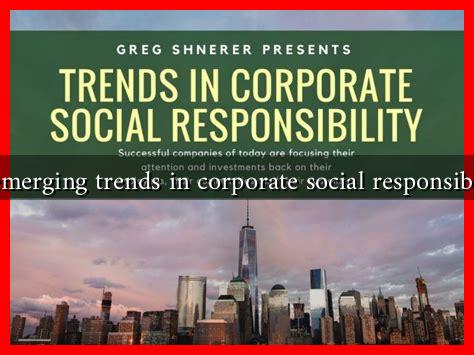-
Table of Contents
Emerging Trends in Corporate Social Responsibility Marketing
Corporate Social Responsibility (CSR) has evolved from a mere compliance obligation to a strategic imperative for businesses worldwide. As consumers become increasingly aware of social and environmental issues, companies are adapting their marketing strategies to align with these values. This article explores the emerging trends in CSR marketing, highlighting how businesses are leveraging these trends to enhance their brand image, engage customers, and drive sales.
The Shift Towards Authenticity
One of the most significant trends in CSR marketing is the demand for authenticity. Consumers are becoming more discerning, seeking genuine commitments to social and environmental causes rather than superficial marketing tactics. Brands that fail to demonstrate authentic engagement risk losing customer trust.
- Transparency: Companies are now expected to be transparent about their CSR initiatives. For instance, Patagonia, an outdoor clothing brand, openly shares its supply chain practices and environmental impact, which has strengthened its reputation among eco-conscious consumers.
- Storytelling: Brands are using storytelling to convey their CSR efforts. TOMS Shoes, for example, shares stories of the communities it supports through its “One for One” model, where a pair of shoes is donated for every pair sold.
Integration of Technology in CSR Marketing
Technology is playing a pivotal role in shaping CSR marketing strategies. Companies are leveraging digital platforms to enhance their outreach and engagement with consumers.
- Social Media Activism: Brands are using social media to promote their CSR initiatives and engage with their audience. For example, Ben & Jerry’s frequently uses its social media platforms to advocate for social justice issues, resonating with its target demographic.
- Data Analytics: Companies are utilizing data analytics to measure the impact of their CSR initiatives. By analyzing consumer feedback and engagement metrics, businesses can refine their strategies to better align with customer values.
Focus on Environmental Sustainability
As climate change becomes an increasingly pressing issue, businesses are prioritizing environmental sustainability in their CSR marketing efforts. This trend is not only beneficial for the planet but also appeals to a growing segment of eco-conscious consumers.
- Green Products: Many companies are developing eco-friendly products. For instance, Unilever has committed to making all of its plastic packaging recyclable, reusable, or compostable by 2025, which has resonated well with environmentally aware consumers.
- Carbon Neutrality: Brands like Microsoft have pledged to become carbon negative by 2030, showcasing their commitment to sustainability and appealing to consumers who prioritize environmental responsibility.
Employee Engagement and Community Involvement
Another emerging trend in CSR marketing is the focus on employee engagement and community involvement. Companies are recognizing that their employees are vital ambassadors for their CSR initiatives.
- Volunteer Programs: Many organizations are encouraging employees to participate in volunteer programs. For example, Salesforce offers employees seven days of paid volunteer time off each year, fostering a culture of giving back.
- Community Partnerships: Collaborating with local organizations can enhance a brand’s CSR efforts. Starbucks has partnered with local nonprofits to support community development, which not only benefits the community but also strengthens the brand’s local presence.
Measuring Impact and Reporting
As CSR marketing matures, companies are increasingly focused on measuring the impact of their initiatives. This trend is driven by the need for accountability and the desire to demonstrate tangible results to stakeholders.
- Impact Reports: Many companies are publishing annual sustainability reports detailing their CSR efforts and outcomes. For instance, Coca-Cola’s sustainability report outlines its progress towards water conservation and community support.
- Third-Party Certifications: Brands are seeking third-party certifications, such as B Corp certification, to validate their CSR claims. This adds credibility and can enhance consumer trust.
Conclusion
The landscape of corporate social responsibility marketing is rapidly evolving, driven by consumer expectations and technological advancements. Authenticity, environmental sustainability, employee engagement, and measurable impact are at the forefront of these emerging trends. As businesses continue to adapt their strategies to align with these values, they not only enhance their brand image but also contribute positively to society and the environment. Companies that embrace these trends will likely find themselves better positioned to thrive in an increasingly conscientious marketplace.
For more insights on CSR and its impact on business, you can explore resources from the B Corporation.


